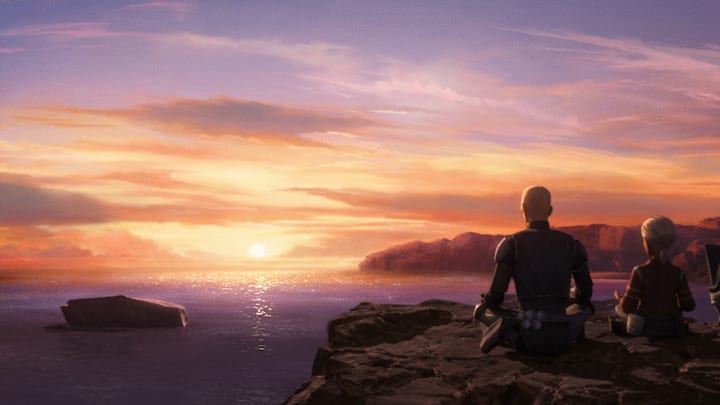Star Wars stories know a thing or two about redemptive character arcs.
Anakin Skywalker finds his way back from the darkest recesses of Darth Vader just in time to save Luke and toss Palpatine down a reactor shaft. Ben Solo also steps out of Kylo Ren’s shadow with not a moment to spare, as Rey needs a helping hand or, better yet, a spare lightsaber.
We see Bodhi Rook defect from the Empire and make his way over to the Rebellion with some much-needed intel in tow. And even General Hux is like a broken clock, right two times a day—or at least he helps the Resistance once or twice, even if it’s just to stick it to the Supreme Leader.
What do all these characters have in common, aside from their tenuous turn toward the light? They all end up very dead, very fast. With their last gasp, Anakin and Ben find themselves once more on the right side of the Force, and then they give up the Force Ghost and exit stage right.
Pretty convenient as far as redemption goes. You make one good call, and then suddenly, you’re counted among the pantheon of galactic heroes.
The more interesting story, I think, is the one that sees Anakin and Ben, Bodhi and Hux, make up for their years of wrongdoing, the harm they’ve caused. A story that sees them grapple with that constant temptation to return to the dark all while doggedly muddling their way toward the light.
So much of The Skywalker Saga was about getting Anakin and Ben back in the “Light” column. Sure, that’s a redemptive arc, I suppose. But the working out of redemption happens next. And that’s the story that Star Wars is so much better at telling across its TV shows. And The Bad Batch knocks it out of the park.
Look no further than Crosshair. I love what we’re seeing of his character, what we’re feeling. It was frustrating to watch him in the first season—to come so close to rejoining his family, only to leave them once more. Why did that hurt so much? Because he made the right decision for him. He did the right thing, even if he returned to his less-than-right ways. He began that slow work of redemption, of grappling with nuance and choice.
In season two, we saw him question the Empire, question his role in its evil ways. Again, it was slow, a drip-drip-drip of realization. And it was frustrating because we knew the Empire is evil. We knew it was going to eventually turn its back on Crosshair. But he had to discover that on his own.
And then, in this final season, we see Crosshair coming to terms with what it means to be welcomed back. With what it means to have someone believe in you, believe in your inherent goodness. Slowly, slowly, he opens up, he trusts. And what’s more, he has to have hard conversations with his brothers, with civilians, with himself about the undeniable harm he committed, the evil he was party to. And he has to take steps—no matter how small—to begin to make amends.
Listen—I know TV shows have more time to tell stories. There’s more room to wiggle in. Books, too; I’m thinking of one Axel Greylark and his propensity for making all the wrong choices immediately after pledging to make only the right ones. Movies have tighter runtimes and tighter scripts.
But I think it’s important to name this storytelling truth all the same. The work of redemption in The Bad Batch, as in life, is not as easy as “snap your fingers, throw your boss down the reactor shaft, become a Force Ghost.” No, it’s the slow, arduous, painful work of Crosshair’s re-learning and rediscovering his own place in the galaxy. And that, in fact, there is one, and he has friends who want him to live in it.
At the end of the day, in our own very real lives, that’s what redemption looks like. It takes time and continual effort. It takes a community, people that believe in us even when we can do nothing but wallow in doubt and shame. We don’t get it right every day—if we get it right at all. But we keep going.
Of course, we want to redeem the Vaders and the Kylos. However, we must remember that after the battle is won and the Emperor strikes down once again, there is still more life to live. Do we make room for those who would come back to the light in our own lives? Do we give ourselves that same room and the corresponding grace to keep making mistakes?
Star Wars is a story of light and dark. And yet, in reality we each find ourselves somewhere in between. If Star Wars television has the space and time to help us realize more of those stories, then I say keep them coming.
If you're interested in reading more on redemption and the spirituality of Star Wars storytelling, check out my new book "My Life with the Jedi: The Spirituality of Star Wars."
